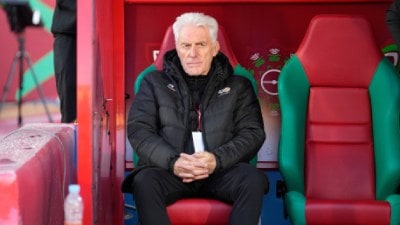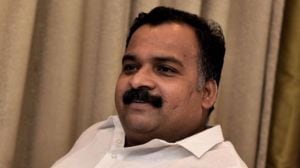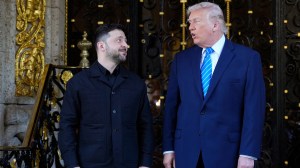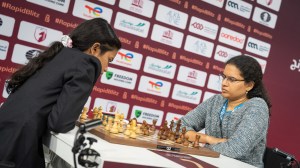A new question in Iran
Predictably, IAEA8217;s face-off with Iran ended in favour of referring Iran to the UN Security Council in the hope that it would seize the...

Predictably, IAEA8217;s face-off with Iran ended in favour of referring Iran to the UN Security Council in the hope that it would seize the 8216;8216;window of opportunity8217;8217; for diplomatic efforts to succeed. That said, Iran will certainly continue with its nuclear programme. But what is neglected by the media in India and elsewhere in the world are the multiple facets of Iranian society. Iran is a juxtaposition of paradoxes and contradictions.
Iran is situated at the heart of the Middle East, yet its population is not Arab. Iran is predominantly Muslim, but Shiite. Iran is rich, yet under-developed. It has been excessively exploited, but never colonised. It is an ethnic patchwork like India, yet its national unity is cohesive. Last but not least, Iran is one of the rare Muslim countries where one finds a vital and active civil society.
Civil society is the subject of intense debate in Iran today because of the limits of accountability and political decentralisation in the country. The actors of Iranian civil society are concerned with the structures that stand between government and citizens. They are as important as were the members of civil society in the Communist period in Poland and Czechoslovakia.
Civil society in Iran today does not mean running a market economy separate from the state. Civil society is an alternative sphere of citizenship which holds a promise of individual autonomy beyond the political and religious sectarian attitudes. More than just a 8216;voluntary sector8217; or a 8216;charitable sector8217;, Iranian civil society is an 8216;ethical sector8217;. It is an everyday effort to feel more at home as a citizen as opposed to being part of a society organised on a theological-political basis. Because of their role in giving meaning to what does not exist, the moral responsibility of members of Iranian civil society is greater than at any other time.
The role of intellectuals has been crucial in the past 15 years to give a new breath to Iranian civil society. While the revolutionary intellectuals of the late 1970s and early 1980s had failed to present alternative narratives to the dominant discourse of the Iranian revolution, the so-called religious intellectuals of the 1990s tried to rethink the old clash between modernity and tradition. Today, religious intellectuals are divided into two groups: reformists and neo-conservatives.
The reformist group is represented by figures such as Abdolkarim Soroosh, Mohsen Kadivar, Alavi-Tabar, Hasan Yousefi Eshkevari, Mojtahed Shabestari, and others. The unifying traits of this group include their recognition of reform in Islamic thought, democracy, civil society and religious pluralism and their opposition to absolute supremacy of the Faqih. The rise of religious intellectuals can be followed through the writings of Soroosh. Soroosh8217;s main idea is that there are unchanging religious truths but our understanding of them remains contingent on our knowledge of science and philosophy. He discusses the possibility of 8216;Islamic democracy8217;.
For Soroosh, the role of the philosopher is to reconcile religion and freedom. He stresses that there are two views of religion 8212; maximalist and minimalist. In the maximalist view, everything must be derived from religion, and most current problems in Islam flow from this view. The minimalist view implies that some values cannot be derived from religion, like respect for human rights. For Soroosh, the minimalist view must prevail, or the balance between Islam and democracy will not be possible.
Mojtahed Shabestari is among the rare religious intellectuals in Iran to challenge the monistic view of Islam. According to Shabestari, the official Islamic discourse in Iran has created a double crisis. The first crisis is due to the belief that Islam encompasses a political and economic system offering answers relevant to all historical periods; the second is entailed by the conviction that the government must apply Islamic law as such.
Unlike the reformist intellectuals, the neo-conservative intellectuals in Iran are in favour of the supremacy of the Supreme Guide, the Faqih, and against concepts such as democracy, civil society and pluralism. They include figures like Reza Davari-Ardakani, Qolam-Ali Haddad Adel and Mehdi Golshani. Most famous among these is Reza Davari-Ardakani, who as an anti-western philosopher is familiar with the works of Martin Heidegger. He takes Heidegger8217;s critique of modernity and gives it an Islamic wording. He rejects the western model of democracy based on the separation of politics and religion. President of the Iranian Academy of Science, Davari-Ardakani could be considered as the philosophical spokesman of the Islamic regime.
The reformist and neo-conservative intellectuals do not dominate the entire Iranian public sphere. There is a new generation of Iranian intellectuals who do not propagate any ideologies and yet they undermine the philosophical and intellectual tenets of the established order. This generation is characterised by the secular post-revolutionary intellectual such as Javad Tabatabai, Babak Ahmadi, Hamid Azodanloo, Moosa Ghaninejad, Nasser Fakouhi and Fatemeh Sadeghi. They can be referred to as 8216;dialogical intellectuals8217; in contrast to the revolutionary intellectuals of the 1970s and 1980s.
The centrality accorded to the idea that truth should speak back to power in the constitution of the new Iranian intellectual space, reveals the affinities of this younger generation with the ideal of value-pluralism. This value-pluralism raises the question of the West as 8216;Other8217;. These actors of Iranian civil society believe that the political and intellectual urgency of Iran8217;s encounter with the global world requires a cross-cultural exchange. In helping maintain this dialogical exchange with modernity and the West, the new generation of intellectuals is freeing itself from the blackmail of 8216;for or against the West8217;.
Being for or against the West is no more the problem. The real problem is, who are we? And we cannot answer this question without feeling part of the world and responsible for what happens in it. Therefore, the idea of responsibility is what matters the most in Iranian civil society. Twenty-seven years after the Iranian revolution the distinctive contribution of Iranian civil society is not how to choose between morality and politics, but how to forge a politics of responsibility. Because in its absence, there would only be untruth.
The writer is an Iranian academic and currently chairprofessor Rajni Kothari Chair in Democracy, CSDS, Delhi
- 01
- 02
- 03
- 04
- 05































